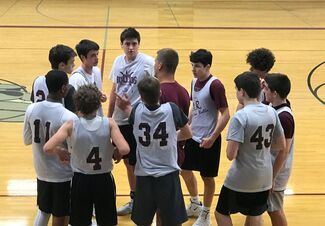Bridging Leadership Lessons from the Workplace and Those Experiences Shaping Today's Youth and Tomorrow's Leaders
“Holding players accountable is uncomfortable. But having players fail because you won’t coach, confront, or correct them, is unacceptable.” - Gary Curneen, Soccer Coach  As I was putting together an article for an upcoming post on Coaches having tough conversations, I found myself dwelling on a specific memory where I was coached up by a former player. As I was putting pen to paper, I could tell by the quantity of what I was writing that I needed to make it a separate post. So that is what I have done and will follow-up next week with the broader topic of tough coaching conversations. Whether you are a professional coach or not, there are so many things to enjoy when you are able to coach a team. The teaching and learning. The relationships that are made. Seeing your impact unfold right in front of you. One of the biggest challenges that coaches, and people have in general are having Fierce Conversations with their team and parents. As I wrote about in 3 Key Principles to Being Coached, what is more challenging for most coaches is to be open to feedback and willing to address your shortcomings. In her book, Fierce Conversations, Susan Scott provides guidance on how to have those conversations and recommendations on how to avoid some of the pitfalls. Be sure to read this book when you get a chance. This concept is drizzled throughout many of my posts as I like to share my struggles and how they helped shape me as a coach. I have been fortunate to have been the recipient of Fierce Conversations throughout my career where I have been approached by someone who was courageous and constructive and helped impact me. The example I am about to share is by far my favorite. When my oldest son Zach was a high school varsity player, he and his teammates showed up at a practice for the 6th grade team that I was coaching that included my middle son, Trey. Growing up, Zach’s team was the dominant team in the area, and we typically played against older teams or made the trip to the cities to play against higher caliber travel teams. When they hit varsity, they enjoyed being considered as one of the top teams in the state and are considered the top team in the school's history. Trey’s team was a good team, but not a great team. We were a top 3 team in the area but didn’t travel to the cities. There were a lot of similarities in the teams including a mix of size and speed, quality of shooters and committed coaches and parents. We also were fortunate to have a large turnout of players, so I always had two full teams to help keep kids interested in the game and to feed the high school program. After observing practice, Zach turned to me and said, “I see what’s wrong with this team. It’s you.” I stood there dumbfounded and taken back by the directness of my oldest son. As I turned to make eye contact with him, I noticed his teammates were all nodding their heads in agreement. Zach continued, “Where’s the discipline? They are not running through the drills. They are missing lines during conditioning. They are not using their off hand. Why are you not expecting more from them? They have the talent, but you are not holding them accountable.” He was right. I was so concerned about how I had treated Zach’s group when they were growing up that I had questioned whether I had pushed them too hard. Demanded too much from them. I had adjusted my style in an effort to reduce the pressure on them in an effort to keep them engaged. I brought the coaches together and shared the observations of Zach and his teammates. While this group of coaches were not part of the coaching group with the older team, they knew the quality of the players and the way they played on the court, so respected their firsthand perspective of what worked and what was needed. We agreed with their assessment and implemented changes immediately. It really transformed our next couple of years of coaching this group and their overall growth. When they entered school ball in 8th grade, they had immediate success. As they team moved to high school, my son was blessed to play in 4 District title games with the team winning 3 of them. Four of the kids from that 6th grade team closed out their career with a district title, accepting the challenge that was placed on them all those years ago and committed to growth and a willingness to be held to high expectations. As a coach, I see that day when a 16-year-old was willing to stand-up and call-out his Coach AND his dad and speak the truth as a turning point for the team, but more importantly, a turning point for me as a leader and a father. I will always cherish the memory for what it represented and what it changed me Beyond Today.
0 Comments
Leave a Reply. |
AuthorTom Brown - a husband and a father who is simply trying to make a difference. Using my experience as a Manufacturing Executive to connect leadership from the boardroom to the hardwood to help teams grow and develop to make a difference in the lives of others. Archives
May 2024
Categories |
Proudly powered by Weebly

 RSS Feed
RSS Feed

